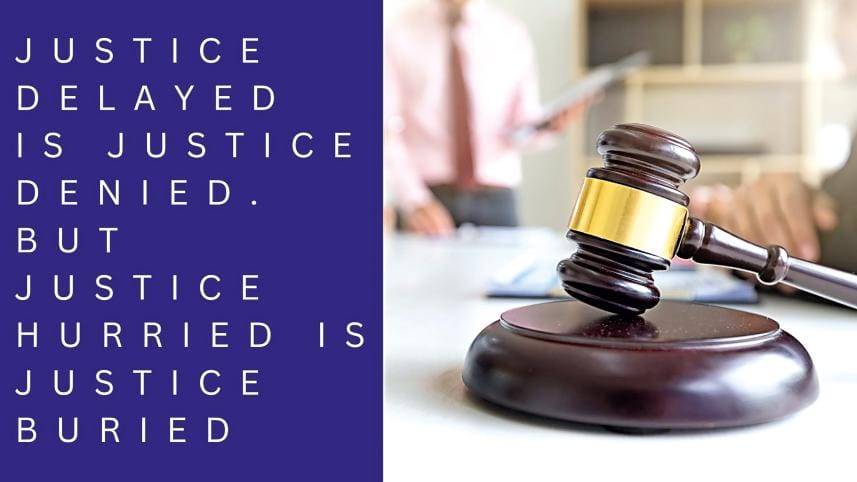Is rushed justice ‘just’?

There is a well-known saying in law, "justice hurried is justice buried". It means the more rushed the justice process is, the more it will compromise the transparency and acceptability of the judicial proceedings. In essence, the case itself will be doomed. On 9 March 2025, Professor Dr. Asif Nazrul, the Honorable Adviser, Ministry of Law, Justice and Parliamentary Affairs, noted that to swiftly complete the trials of rape cases, investigation will be completed in 15 days and trial will complete in 90 days. While this appears to be a step in the right direction, it raises important concerns regarding the thoroughness of the legal process.
According to Bangladesh's Code of Criminal Procedure 1898, the investigation and trial of any crime must follow a prescribed process. On the other hand, the Women and Children Repression Prevention Act 2000 specify provisions for the expedited trial of crimes such as rape. However, even with a solid legal framework, one must ask: can a comprehensive and thorough investigation, which is critical to proving the crime, be completed within a brief timeframe and what will be the consequences if the investigations are not thorough?
Proposals to complete investigations hastily, without addressing the underlying law-and-order issues, are not quite connected with the reality. First, let us assess whether forensic reports or proper investigations can be obtained even within a month. Only after that can we discuss how a comprehensive investigation can be concluded in 15 days.
Crimes like rape often require DNA and forensic reports right from the outset. However, due to the limitations of forensic laboratories and their heavy caseloads in Bangladesh, it typically takes at least a month to receive a DNA test report. If it is attempted to be rushed, there is a good chance that we may get the wrong results vitiating the entire process.
Furthermore, the time required for crime scene inspections, gathering statements from victims and witnesses, obtaining medical reports, are all significant. If these procedures are rushed, the quality of the investigation will be inevitably compromised. As a result, the case will lack credibility in court, and the merit of the case could be ruined from the start.
Speedy resolutions without thorough procedural alignment only increase the likelihood of flawed investigation reports and decisions. This can potentially also lead to wrongful release of real perpetrators as insufficient evidence or a weak chargesheet could allow actual criminals to be acquitted. Moreover, innocent individuals may be convicted. This will not only cause immense frustration for the victims but also create opportunities for criminals to continue their criminal activities.
Moreover, while public opinion may influence lower courts, the Supreme Court is less moved by mass sentiments due to the temporal gap between the two judicial processes. As a result, hurried judgments given by lower courts often do not hold up in higher courts. Therefore, it is often seen that a decision, reached upon significant public protests, is later changed by the higher court. Indeed, the saying "justice hurried is justice buried" remains valid. On the other hand, "justice delayed is justice denied" is also true. Swift justice is essential, but it must not undermine procedural justice.
Proposals to complete investigations within 15 days and trials within 90 days, without addressing the underlying law-and-order issues, are not quite connected with the reality. First, let us assess whether forensic reports or proper investigations can be obtained even within a month. Only after that can we discuss how a comprehensive investigation can be concluded in 15 days. Rushing sensitive issues, such as rape cases, will ultimately lead to injustice disguised as justice.
The result of inadequate and flawed investigations is quite predictable — acquittal of the accused. Justice must be rooted in the law and fairness, not in haste.
The writer is Advocate, Supreme Court of Bangladesh.



 For all latest news, follow The Daily Star's Google News channel.
For all latest news, follow The Daily Star's Google News channel.
Comments